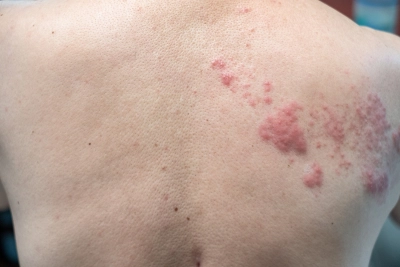SHINGLES
 DO YOU SUDDENLY HAVE A BURNING SENSATION ON A CERTAIN AREA OF THE SKIN FOLLOWED BY AN OUTBREAK OF A RASH AND BLISTERS? IT COULD BE SHINGLES.
DO YOU SUDDENLY HAVE A BURNING SENSATION ON A CERTAIN AREA OF THE SKIN FOLLOWED BY AN OUTBREAK OF A RASH AND BLISTERS? IT COULD BE SHINGLES.
Photo: © Mumemories - stock.adobe.com
What is a shingles and what should you look out for? LEARN EVERYTHING YOU NEED TO KNOW HERE:
-
What is shingles?
-
What treatment it available?
-
Are there any complications?
-
How can I protect myself?
-
Can I get vaccinated against herpes zoster?
-
Is the herpes zoster vaccination recommended?
What is shingles?
Shingles is caused by the reactivation of the latent Herpes Zoster (HZV) virus. This is the same virus that also causes chickenpox; however, the herpes simplex virus infection usually only covers a small area, whereas the HZV virus often affects entire areas of the skin and the underlying nerves - hence the name: shingles.
Usually only one half of the body is affected, but it can occur from head to toe. It begins with a burning and/or tingling sensation in the affected area, followed by the appearance of a reddened rash, and then an outbreak of small blisters. The disease can be very uncomfortable and requires appropriate treatment.
The virus remains in the human body for life after a chickenpox infection, and can flare up as shingles at any time, caused by a weakened immune system, medication or stress. Regardless, it is important to assess if an undiagnosed underlying condition is the cause of the reactivation of the virus.
What treatment it available?
Depending on how the symptoms develop, different treatment options are available. It is important that treatment is started quickly. A three-part treatment consists of: First, adequate pain relief is administered. Second, antiviral treatment should begin. This means that the virus can no longer divide and can therefore no longer spread. To do this, it is necessary to start treatment as soon as possible. Third, a focus on skin protection and the subsequent healing process. There is evidence of faster healing and better pain control in herpes zoster through the additional administration of high-dose vitamin C and vitamin D.
Book your appointment here in our center in Vienna
Are there any complications?
Usually shingles is cured without any further problems. It is important to use sun protection and take good care of the wounds therefore allowing the skin to heal without any problems. If shingles appears on the face, the optic or auditory nerves could be affected, which in turn can lead to complications. In that case, an ophthalmologist or ENT should be consulted. Zoster neuralgia can also occur, especially in the cases of shingles on the face or in older patients. This is manifested by severe pain or itching, which can persist for a long time. This consequence can usually be prevented by starting treatment immediately after diagnosis.
How can I protect myself?
There has been a vaccination against shingles available for several years. It is recommended for immunodeficient patients and patients over the age of 50.
Can I get vaccinated against herpes zoster?
Yes, there is now a vaccination against herpes zoster. The vaccination is called Shingrix® and has been approved by GlaxoSmithKline since 2018. Shingrix® is indicated for the prevention of herpes zoster (HZ) and postherpetic neuralgia (PZN) in:
Adults aged 50 and over
Adults 18 years of age and older at increased risk of herpes zoster
The primary schedule consists of two doses: a first starting dose followed by a second dose 2 months later. If the vaccination schedule needs to be flexible, the second dose can be given 2 to 6 months after the first dose. The statutory health insurance currently does not reimburse the vaccination. We only offer the vaccination for our existing patients during consultation hours at the pharmacy retail price of EUR 205 per dose. In addition, there is a flat fee for administration of EUR 20 and the regular doctors fee.
Is the herpes zoster vaccination recommended?
The vaccination against herpes zoster is neither approved nor intended for children! It is an adult vaccination only.
The vaccination is recommended for all people over the age of 50. For certain groups of people (for example with severe underlying diseases that impair the immune system), vaccination can also be given at an earlier age according to an individual doctor's recommendation. It is not necessary to check the immune status prior to vaccination. People who have already had a herpes zoster infection can also be vaccinated (several years after).
Two vaccines are currently approved: a live vaccine (Zostavax) and the inactivated vaccine Shingrix®. Since the live vaccine Zostavax loses its effectiveness after a few years and is unsuitable for people with immunodeficiency, it is no longer recommended. Instead, the inactivated vaccine Shingrix is recommended because of its long-lasting effectiveness for the prevention of herpes zoster. The recommendation applies to people over the age of 50 and, after individual medical considerations, also for certain groups of people with a particularly high risk. The inactivated vaccine is administered intramuscularly (IM) twice with an interval of at least two months.


